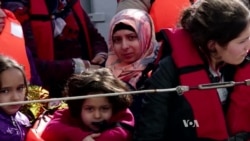The European Union and Turkey appear close to striking a deal to try to end the flow of migrants crossing to Greece. The proposal has been criticized by human rights group Amnesty as ‘inhumane’.
After talks in Brussels lasting late into Monday, EU Council President Donald Tusk declared "the days of irregular migration to Europe are over."
“The irregular flow of migrants along the Western Balkan route has now come to an end. To facilitate this change we agreed to help Greece and to deploy massive humanitarian assistance,” he said.
In principle, all irregular migrants arriving in Greece from Turkey will be returned.
For each Syrian national who is sent back, Turkey wants Europe to accept an officially recognized Syrian refugee from its territory. Asylum applications by other nationalities would be dealt with case-by-case.
'Game-changing' agreement
Turkish Prime Minister Ahmet Davutoglu called the agreement "game-changing."
“Our objective is to discourage illegal migration to prevent human smugglers, to help people who want to come to Europe, through encouraging legal migration in a disciplined and regular manner,” he said.
Thousands of migrants are stuck on Greece’s border with Macedonia, as Balkan states have all but closed the route north. Many of them, like Afghan asylum seeker Alijon, are unsure of their next move.
"Now, I do not know because if they we say that you should go [to] Turkey, I will go [to] Turkey, it is better. If I go ahead, I should pay a lot for a smuggler, but I do not have enough money to pay to the smuggler and go ahead," said Alijon.
In return for accepting returned migrants, Turkey has asked for a doubling of EU aid to help it deal with the crisis, to $6.6 billion. Ankara also wants visa-free travel and EU accession talks to be sped up.
Amnesty International and aid agency Doctors without Borders have criticized the deal, saying that each resettlement place offered by Europe would be contingent upon another Syrian risking their life by crossing the sea to Greece.
“If we are going to see Turkey being used effectively as Europe’s border guard, that has real risks and dangers for refugees themselves. By no means is Turkey a safe country for refugees and migrants. We have documented many violations against them,” said Gauri van Gulik from Amnesty.
The U.N. refugee agency has also expressed concern over the proposal, criticizing any arrangement involving the blanket return of individuals from one country to another.





